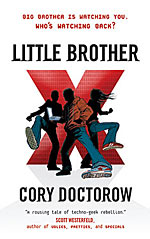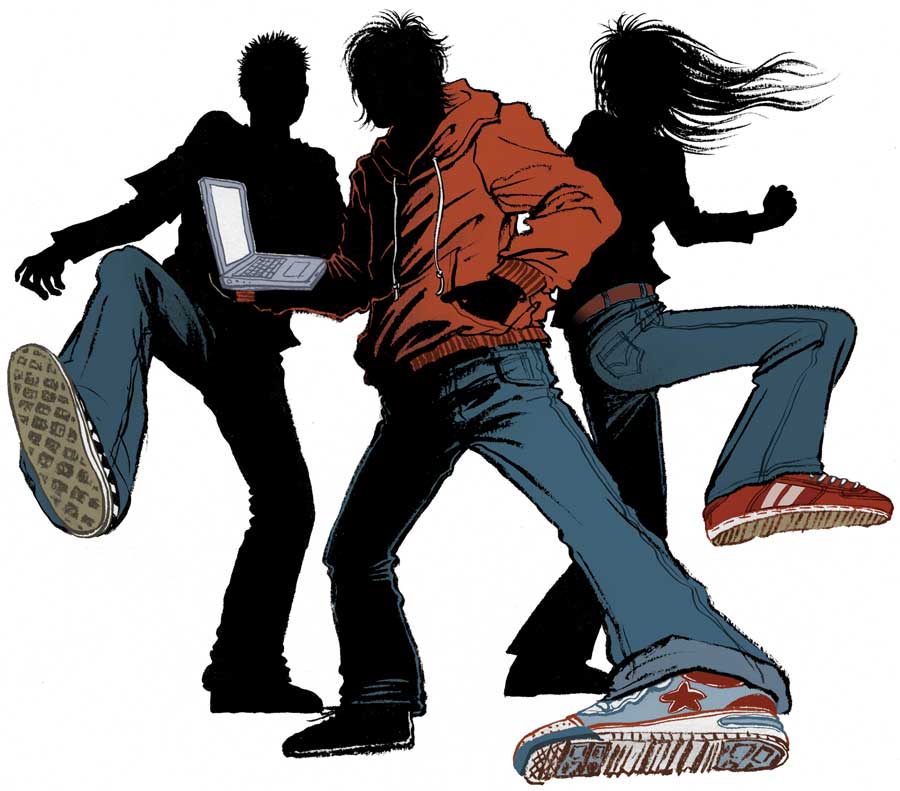
![]() Linguana
Linguana
7/26/2015
![]()
Last year, I watched Citizenfour with some friends. I had read about the whole situation before, of course, but that documentory really hammered in the point. It actually left me quite depressed for a while, and then I did what any SFF fan would do in my place: I picked up some Cory Doctorow books. Calling this science fiction feels almost wrong because it's not a future vision, nor a very alternate version of our world. Yes, things really are that messed up.
LITTLE BROTHER
by Cory Doctorow
Published by: Tor, 2008
Ebook: 382 pages
Series: Little Brother #1
My rating: 7,5/10
First sentence: I'm a senior at Cesar Chavez High in San Francisco's sunny Mission district, and that makes me one of the most surveilled people in the world.
Marcus aka "w1n5t0n," is only seventeen years old, but he figures he already knows how the system works-and how to work the system. Smart, fast, and wise to the ways of the networked world, he has no trouble outwitting his high school's intrusive but clumsy surveillance systems.
But his whole world changes when he and his friends find themselves caught in the aftermath of a major terrorist attack on San Francisco. In the wrong place at the wrong time, Marcus and his crew are apprehended by the Department of Homeland Security and whisked away to a secret prison where they're mercilessly interrogated for days.
When the DHS finally releases them, his injured best friend Darryl does not come out. The city has become a police state where every citizen is treated like a potential terrorist. He knows that no one will believe his story, which leaves him only one option: "M1k3y" will take down the DHS himself.
Here's your updated version of 1984 - for teenagers. Sort of. Marcus knows his way around a computer, and makes use of that knowledge in order to, well, be a teenager and do stuff like skipping school without anyone noticing (or at least without leaving proof). Outwitting the school's gait recognition monitors is nothing special for him and his friends. But when a bomb explodes in San Francisco and Marcus and his friends are found close to the scene, their lives change drastically.
This point in the book was the moment I was hooked, the moment I felt the terror that is so easy to suppress in real life. These kids get taken to a secret prison - they have no idea where they are, how much time has passed, they are barely fed, they are interrogated, accused, psychologically tortured. And the worst thing is, they make Marcus feel guilty even though he had nothing whatsoever to do with the explosion. Here is a teenager who is made to feel like a terrorist because he may have evaded school surveillance to go play a game with his friends...
Little Brother does a fantastic job at conveying the horror that comes with constant surveillance. Whether you explore it on a personal level - do you really want people to know your browser history? - or on a more global one - what if you're a model citizen but your collected data makes it look like you did something wrong? - it's always terrifying. In order to bring some balance to his book, Cory Doctorow opposes Marcus with a father who is totally pro surveillance. He wants his country safe and if that means that people know everything he does, all the better. He's got nothing to hide after all. Right? It's the same argument I hear from my own family and friends - and it completely misses the point.
Now this may sound ridiculous when talking about a book that is full of paranoia, but Marcus wasn't quite paranoid enough for my taste. Any reasonable person will be careful with their data by now, but if you've actually been taken in by the authorities and interrogated for a week, shouldn't you be super jumpy? Even more suspicious of everything and anything? Marcus is much more careful after his imprisonment but he also won't let the DHS win or the fear take over his life. Instead, he takes up arms in the best way he knows - by using the internet and getting like-minded people together. I suppose it makes sense because otherwise, there would be no story. In his place, I would have probably been scared to death and never gone online again...
Here's another wonderful thing about Cory Doctorow. He knows how to explain things really, really well. The chapter on encription could have gone terribly wrong - either because it was too technical or because it wasn't made clear enough why it's important. But Doctorow found the perfect middle ground. He explains how things work in easy-to-understand language but still gets his point across. When things get too difficult, Marcus lets us know there's crazy maths involved and leaves it at that. You've got to trust your narrator to know what he's doing. These manuals on how Marcus evades the constant surveillance and keeps his privacy are fascinating not only because they serve the plot but because these are things that every person could do.

Praise aside, the middle part of the novel was my least favorite, probably because it focused a lot on Marcus' private life, especially with that girl he met and might be falling in love with. These chapters weren't badly written, they were just a very generic teenage romance, including the seemingly jealous female best friend and meeting the girlfriend's parents for the first time. I understand the novel needed more than just the surveillance story line to be balanced, and I didn't hate this part. But it wasn't overwhelming either. This isn't a character-driven book and so the teenage protagonists were all rather bland - but they served their purpose, that of telling a gripping story and getting an important message across.
Towards the end, the pace picks up again and leads to the climax I had been waiting for. Everything is at stake, lives are threatened, things go seriously batshit crazy, and the story is led to a satisfying conclusion. But apart from a good story, I believe this book is incredibly important because it reminds us just what times we are living in. This is not a futuristic story - it pretty much shows the world as it is. But even as we lose most of our privacy (or, in many cases, give it away freely!), this book reminds us that we have a voice and that small changes can make a big difference.
MY RATING: 7,5/10
P.S.: Cory Doctorow, being awesome when it comes to copyright, offers this book on his homepage for free! Do yourself a favor and get a copy.
https://sffbookreview.wordpress.com/2015/07/24/cory-doctorow-little-brother/